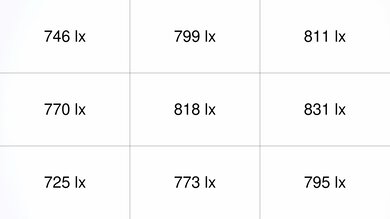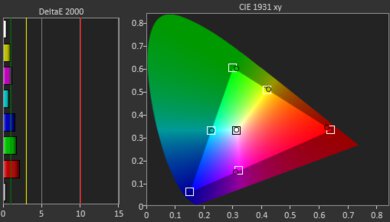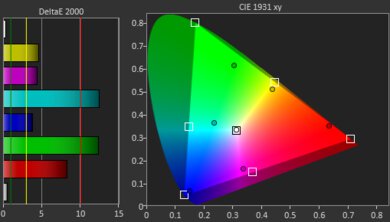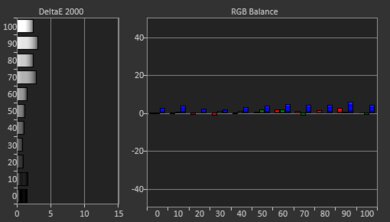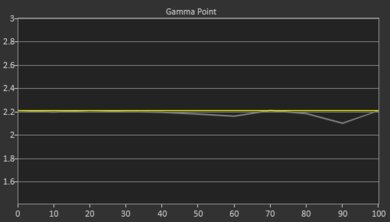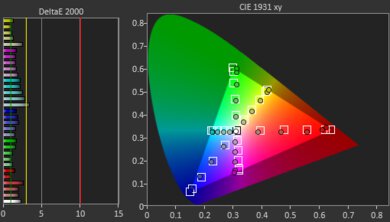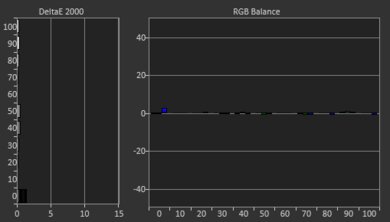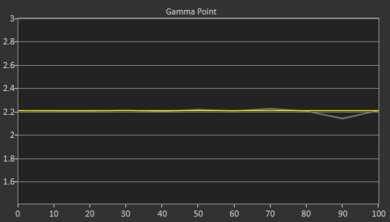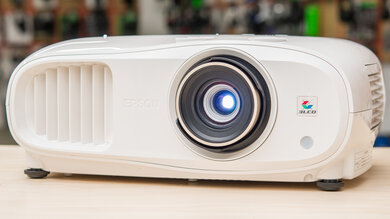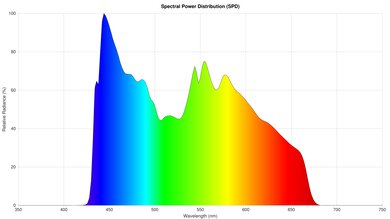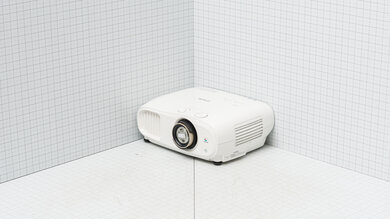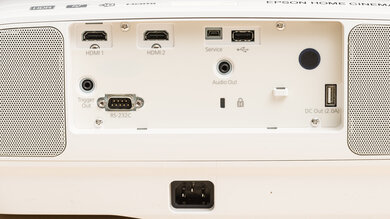The Epson Home Cinema 3800 is a 4k HDR LCD projector. It projects an 80" image at a distance of approximately 8 feet, 100" at a distance of ~10 feet, and 120" at a distance of ~12 feet. The projector has Epson's 4k PRO-UHD technology with a 3-chip design, allowing it to project colorful and sharp images with twice the resolution of 1080p. It's fully 10-bit HDR capable and has manual focus and lens-shifting settings. The projector has two HDMI 2.0 ports for full 4k @ 60Hz gaming, Bluetooth with aptX support, and two integrated 10W speakers.
Our Verdict
The Epson 3800 is great for watching movies. It's very bright, so it performs well in bright rooms. While it doesn't have a wide color gamut, colors pop due to the projector's brightness. The 3800's color accuracy is excellent out of the box, and it looks fabulous after calibration, thanks to the projector's 11-point white balance and full-color calibration features. Where it falls behind the best home-theater options is in near-dark material. In very dark, near-black scenes, blacks are lifted, and the image loses some of that inky look you get from higher-contrast models. It does perform much better in brighter scenes, however.
- Very bright projector with excellent brightness uniformity.
Very good contrast for a pleasant viewing experience in most scenes.
Excellent color accuracy nearly out of the box, which you can improve even further with calibration.
- Doesn't have Wi-Fi and lacks a smart interface.
Doesn't have Dolby Vision or HDR10+.
Blacks are noticeably lifted in darker content.
The Epson 3800 is okay for casual big-screen gaming. It's extremely bright, with very accurate colors out of the box. It accepts 4k @ 60Hz, but it tops out at 60Hz at every resolution. Unfortunately, while the unit's latency is okay for slower titles, it's not quite fast enough for twitch shooters or for platformers. There's also no Dolby Vision support for Xbox gamers and no true 1440p support.
- Very bright projector with excellent brightness uniformity.
Very good contrast for a pleasant viewing experience in most scenes.
Excellent color accuracy nearly out of the box, which you can improve even further with calibration.
No 120Hz or true 1440p support.
Relatively high input lag even when set to its 'Fast' preset.
Doesn't have Dolby Vision or HDR10+.
Blacks are noticeably lifted in darker content.
The Epson 3800 is an extremely bright projector. In Natural mode, it can comfortably light a large screen and still look punchy in a living room with a few lights on or some daylight leaking in. Colors stay vivid rather than washing out, and you have plenty of headroom to switch to a quieter lamp mode or dim the image if you're in a fully light-controlled home theater.
Very bright even after calibration.
Fantastic brightness uniformity with strong color brightness.
The Epson 3800 has very good contrast in mixed and brighter scenes, where it keeps images looking rich and dimensional instead of washed out. In typical movies and games, shadows and highlights separate well enough to give scenes a satisfying sense of depth. Its weakness is near-black content. In very dark shots with only small highlights, the black floor rises more than on the best contrast performers, so letterbox bars and shadowy backgrounds don't look as deep.
Very good native contrast that excels in brighter scenes.
Blacks are noticeably lifted in darker content.
Changelog
-
Updated Jan 14, 2026:
We updated the Native Contrast results after a recent adjustment to our testing. We also touched up the Our Verdict section and the Popular Projector Comparisons box.
-
Updated Jan 14, 2026:
We've modified the text in our Brightness and Native Contrast text boxes as a result of our latest test bench and added a Sequential Contrast test. We've also added Brightness and Contrast performance usages in the Verdict section.
- Updated Jan 14, 2026: We've converted the review to Test Bench 0.11, which renames our Contrast test to Native Contrast, and adds a Sequential Contrast test box. We also added new Brightness and Contrast performance usages in Our Verdict. See the 0.11 changelog.
-
Updated Oct 03, 2025:
We made some minor adjustments before our official TBU 0.10 launch.
Check Price
Differences Between Sizes And Variants
The Epson Home Cinema 3800 is positioned within Epson's upper mid-range 3LCD home theater lineup. It uses pixel‑shift, has HDR10 and HLG support, and has Bluetooth with aptX support. In Epson's lineup, it slots above the basic Epson Home Cinema 1080 (which lacks HDR and smart streaming) and the Epson Home Cinema 2350 (which has HDR support and comes with an Android TV dongle), but below the premium Epson Home Cinema 5050UB (with motorized optics, superior contrast, and enhanced color performance). Here's how they stack up:
| Model | Native Resolution | Pixel-Shift (4K PRO-UHD) | Brightness | HDR Formats | Lens / Optics | Smart / Wireless |
|---|---|---|---|---|---|---|
| Epson Home Cinema 1080 | 1080p (3LCD) | No | 3,400 lm | None | 1.2× manual zoom; Throw 1.02–1.23; No lens shift | Built-in Wi-Fi 5 with Miracast screen mirroring; no Android TV |
| Epson Home Cinema 2350 | 1080p (3LCD) | 2-phase (1920×1080×2) | 2,800 lm | HDR10, HLG | 1.62× manual zoom; Throw 1.32–2.15; Vertical lens shift ±60% (manual) | Android TV dongle (Chromecast built-in); Bluetooth audio; HDMI ARC |
| Epson Home Cinema 3800 | 1080p (3LCD) | 2-phase (1920×1080×2) | 3,000 lm | HDR10, HLG | 1.62× manual zoom; Throw 1.32–2.15; Lens shift ±60% V / ±24% H (manual) | No Android TV; Bluetooth (incl. aptX) for audio |
| Epson Home Cinema 5050UB | 1080p (3LCD) | 2-phase (1920×1080×2) | 2,600 lm | HDR10, HLG | 2.1× motorized zoom/focus/shift; Throw 1.35–2.84; Lens shift ±96% V / ±47% H; lens memory | No built-in smart features |
You can see the label.
Popular Projector Comparisons
The Epson 3800 is a great all-around home-theater projector. It delivers solid performance in its class, with high brightness and very good native contrast. Compared with the more expensive Epson Home Cinema 5050UB, you give up a bit of contrast and some lens and placement flexibility, but most people will be happier with the 3800's lower price. The XGIMI HORIZON Ultra offers more built-in features, like an integrated smart OS and Wi-Fi, but the Epson easily wins on pure picture quality, especially in dark rooms.
See our recommendations for the best home projectors and the best projectors for home theater. If you prefer a cheaper unit, consider the best projectors under $1,000 instead.
The Epson Home Cinema 5050UB is better than the Epson Home Cinema 3800. The 3800 has higher peak brightness than its more expensive sibling. Still, the 5050UB has better contrast and a noticeably wider color gamut, so it's the better-looking of the two projectors when watching movies in a dark room.
The Epson Home Cinema 3800 is noticeably better than the Epson Home Cinema 2350. The 3800 has far deeper blacks, with better contrast and accuracy than the 2350. The 2350 does have a slightly wider color gamut, but it doesn't have the necessary punch to make them look very vibrant. Still, the 3800 doesn't come with a smart OS and is rather barebones when it comes to features, while the 2350 comes with an Android TV dongle.
The Epson Home Cinema 3800 is much better than the BenQ HT3550. The Epson is much brighter and has better contrast with significantly brighter colors. It's also vastly more accurate before calibration and has near-perfect accuracy post-calibration. The BenQ is smaller and lighter and has auto keystone correction on the vertical axis, so it's easier to carry around and faster to install.
The Epson Home Cinema 3800 is much better than the Epson Home Cinema 1080. Everything the 1080 can do, the 3800 can do better. The 3800 is brighter, has HDR support, has better contrast and a wider color gamut, and projects a sharper image with its pixel-shifting technology. It even has slightly better pre-calibration accuracy than the already great 1080.
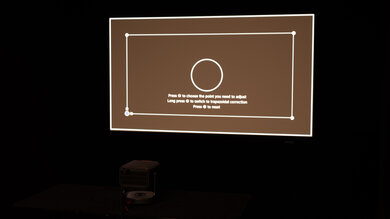
We've independently bought and tested over 60 projectors, and we've published all the detailed results for each so you can decide which one to buy. These have all been tested under the same standardized methodology, allowing you to compare them side by side. We still have all these projects in our lab so we can continually go back and compare them to ensure our reviews are still accurate. All our test methodology is also public on our website, so you can validate the results yourself.
Throw Calculator
Global Controls
Test Results

The Epson 3800 projector is extremely bright in its calibrated Natural mode. It easily lights up a 100" screen and still looks punchy in a room with a few lights on, and its fantastic brightness uniformity means there are no distracting dim corners. White and color light output are also very close, so colors stay vibrant instead of washing out when you enlarge the image.
The table below shows the additional headroom you gain by switching to brighter, yet less accurate, modes like Bright Cinema or Dynamic, which are better suited for daytime viewing or very bright rooms.
| Picture Mode | WLO | CLO |
|---|---|---|
| Dynamic | 2967 lm | 2968 lm |
| Bright Cinema | 2226 lm | 2224 lm |
| Cinema | 2012 lm | 2013 lm |
The Epson 3800 has very good native contrast overall. In most movies and games, it creates a satisfying sense of depth, especially once scenes have some midtones and highlights, where blacks stay fairly grounded, and the image looks rich instead of flat. Where it falls behind is in the darkest content. In near-black scenes with only a few small highlights, its black floor looks more lifted, so letterbox bars and shadowy backgrounds are less inky, and blacks look gray. If your priority is those very dark, high-contrast scenes, consider a model with stronger near-black performance, such as the Epson Home Cinema 5050UB.
The Epson HC3800 has a decently wide color gamut. It does an excellent job with the Rec. 709 color space used with SDR content, although it struggles with the wider Rec. 2020 color space. If you prefer more saturated colors at the cost of color accuracy, setting the projector's color space to Rec. 2020 does result in a wider, but less accurate, color gamut in the Rec. 709 space.
The Epson Home Cinema 3800 4k has excellent pre-calibration accuracy. There are minor accuracy errors in its white balance and colors, but they're not noticeable. Its color temperature leans slightly on the cold side, giving everything a subtle blue tint.
The Epson 3800 projector has full 11-point white balance calibration and color calibration. It looks spectacular after calibration, with fantastic color and white balance accuracy, and its color temperature is exactly on target.
The Epson Home Cinema 3800 uses a lamp light source rated at roughly 3,500–5,000 hours, depending on the mode, after which you'll need to replace the lamp. It isn't a native 4k projector; Epson's pixel-shifting places more addressable pixels on screen for higher apparent detail than 1080p, but it's not as crisp as true 4k. Its lamp-driven SPD is broad and continuous, so wide-gamut coverage and HDR color volume are more limited than tri-laser models.
The Epson 3800 is a standard-throw projector with manual zoom/focus and manual keystone, but keep the lens centered and avoid digital keystone when possible for the cleanest image. Here are some real-world 16:9 throw distances, to help you with placement:
- 80″ → ~7.7–12.5 ft
- 100″ → ~9.6–15.6 ft
- 120″ → ~11.5–18.7 ft
- 150″ → ~14.4–23.4 ft
- 200″ → ~19.2–31.2 ft
The Epson Home Cinema 3800 isn't meant to be portable as it's quite heavy and lacks an integrated battery, so you need to plug it in. The projector lacks auto keystone correction, so you'll need to adjust the image geometry manually. Additionally, it doesn't have autofocus. It does have two 10W speakers.
If you prefer a more modern and portable unit, consider the Anker Nebula X1 instead.
At maximum brightness, the fan is plainly audible in quiet rooms.
The Epson Home Cinema 3800 projector features a 2.0A DC Out USB port for power delivery, suitable for a streaming dongle or similar device. It also has a 12V trigger out port to connect your screen, allowing you to signal the screen to unfold when the projector powers on and, conversely, retract the screen when it's powered off. Unfortunately, the projector doesn't support Wi-Fi, but it does support Bluetooth with aptX.
The Epson Home Cinema 3800 accepts 4k @ 60Hz and 1080p @ 60Hz (including full 4:4:4 at 1080p/60). There's no 4k @ 120Hz or 1080p @ 120Hz, and the projector is effectively limited to 60Hz across the board; 1440p isn't natively supported.
The projector's input lag is on the high side for any serious gaming, even in its 'Fast' image processing preset. The speed difference between 'Fast' and 'Fine' is rather small, but it'll be noticeable for twitch gaming. Still, the input lag is alright for slower single-player titles.
There's no ARC/eARC or optical output on the projector, so it can't pass digital surround formats. Route sources into your AVR/soundbar first and then send video to the projector.

